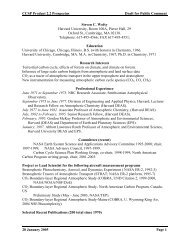Decision support experiments and evaluations using seasonal to ...
Decision support experiments and evaluations using seasonal to ...
Decision support experiments and evaluations using seasonal to ...
You also want an ePaper? Increase the reach of your titles
YUMPU automatically turns print PDFs into web optimized ePapers that Google loves.
•<br />
•<br />
ness with cus<strong>to</strong>mized products for local<br />
users. This requires that <strong>to</strong>ol developers<br />
engage a wide range of participants, including<br />
those who generate <strong>to</strong>ols <strong>and</strong> those who<br />
translate them, <strong>to</strong> ensure that speciallytailored<br />
products are widely accessible <strong>and</strong><br />
are immediately adopted by users insuring<br />
relevancy <strong>and</strong> utility.<br />
The process of <strong>to</strong>ol development must be<br />
inclusive, interdisciplinary, <strong>and</strong> provide<br />
ample dialogue among researchers <strong>and</strong><br />
users. To achieve this inclusive process,<br />
professional reward systems that recognize<br />
people who develop, use, <strong>and</strong> translate<br />
such systems for use by others are needed<br />
within management <strong>and</strong> related agencies,<br />
universities, <strong>and</strong> organizations. Critical <strong>to</strong><br />
this effort, further progress in boundary<br />
spanning—the effort <strong>to</strong> translate <strong>to</strong>ols <strong>to</strong><br />
a variety of audiences—requires considerable<br />
organizational skills.<br />
Information generated by decision-<strong>support</strong><br />
<strong>to</strong>ols must be implementable in the short<br />
term for users <strong>to</strong> foresee progress <strong>and</strong> <strong>support</strong><br />
further <strong>to</strong>ol development. Thus, efforts<br />
must be made <strong>to</strong> effectively integrate public<br />
concerns <strong>and</strong> elicit public information<br />
through dedicated outreach programs.<br />
ES.5 LOOKING TOWARD THE<br />
FUTURE; RESEARCH PRIORITIES<br />
A few central themes emerge from this Product,<br />
<strong>and</strong> are summarized in this Section. Key<br />
research priorities are also highlighted.<br />
ES.5.1 Key Themes<br />
1) The “Loading Dock Model” of Information<br />
Transfer is Unworkable.<br />
Skill is a necessary ingredient in perceived<br />
forecast value, yet more forecast skill by itself<br />
does not imply more forecast value. Lack of<br />
forecast skill <strong>and</strong>/or accuracy may be one of the<br />
impediments <strong>to</strong> forecast use, but there are many<br />
other barriers as well. Such improvements must<br />
be accompanied by better communication <strong>and</strong><br />
stronger linkages between forecasters <strong>and</strong> potential<br />
users. In this Product, we have stressed<br />
that forecasts flow through knowledge networks<br />
<strong>and</strong> across disciplinary <strong>and</strong> occupational<br />
boundaries. Thus, forecasts need <strong>to</strong> be useful<br />
<strong>and</strong> relevant in the full range from observations<br />
<strong>to</strong> applications, or “end-<strong>to</strong>-end useful”.<br />
<strong>Decision</strong>-Support Experiments <strong>and</strong> Evaluations <strong>using</strong> Seasonal <strong>to</strong><br />
Interannual Forecasts <strong>and</strong> Observational Data: A Focus on Water Resources<br />
2) <strong>Decision</strong> Support is a Process Rather Than<br />
a Product.<br />
As knowledge systems have come <strong>to</strong> be better<br />
unders<strong>to</strong>od, providing decision <strong>support</strong><br />
has come <strong>to</strong> be unders<strong>to</strong>od not as information<br />
products but as a communications process that<br />
links scientists with users.<br />
3) Equity May Not Be Served.<br />
Information is power in global society <strong>and</strong>,<br />
unless it is widely shared, the gaps between<br />
the rich <strong>and</strong> the poor, <strong>and</strong> the advantaged <strong>and</strong><br />
disadvantaged may widen. Efforts <strong>to</strong> meet,<br />
communicate effectively with, <strong>and</strong> incorporate<br />
the perspectives of the poor <strong>and</strong> disadvantaged<br />
require the ability: <strong>to</strong> transmit <strong>and</strong> disseminate<br />
information in a clear, non-technical <strong>and</strong><br />
vernacular language; <strong>to</strong> embrace the actual<br />
concerns of farmers, peasants, villagers, etc.<br />
(e.g., drought, floods, their effects on crops,<br />
livelihoods), <strong>and</strong> <strong>to</strong> undertake public outreach<br />
that elicits the type of information they need –<br />
not just the kind of information scientists are<br />
likely <strong>to</strong> generate.<br />
4) Science Citizenship Plays an Important Role<br />
in Developing Appropriate Solutions.<br />
A new paradigm in science is emerging, one<br />
that emphasizes science-society collaboration<br />
<strong>and</strong> production of knowledge tailored more<br />
closely <strong>to</strong> society’s decision-making needs.<br />
Concerns about climate impacts on water resource<br />
management are among the most pressing<br />
problems that require close collaboration<br />
between scientists <strong>and</strong> decision makers.<br />
5) Trends <strong>and</strong> Reforms in Water Resources<br />
Provide New Perspectives.<br />
Some researchers suggest that, since the 1980s,<br />
a “new paradigm” or frame for federal water<br />
planning has occurred, although no clear<br />
change in law has brought this change about.<br />
This new paradigm appears <strong>to</strong> reflect the ascendancy<br />
of an environmental protection ethic<br />
among the general public. The new paradigm<br />
emphasizes greater stakeholder participation<br />
in decision making; explicit commitment <strong>to</strong><br />
environmentally-sound, socially-just outcomes;<br />
greater reliance upon drainage basins as planning<br />
units; program management via spatial <strong>and</strong><br />
managerial flexibility, collaboration, participation,<br />
<strong>and</strong> sound, peer-reviewed science; <strong>and</strong>,<br />
5




